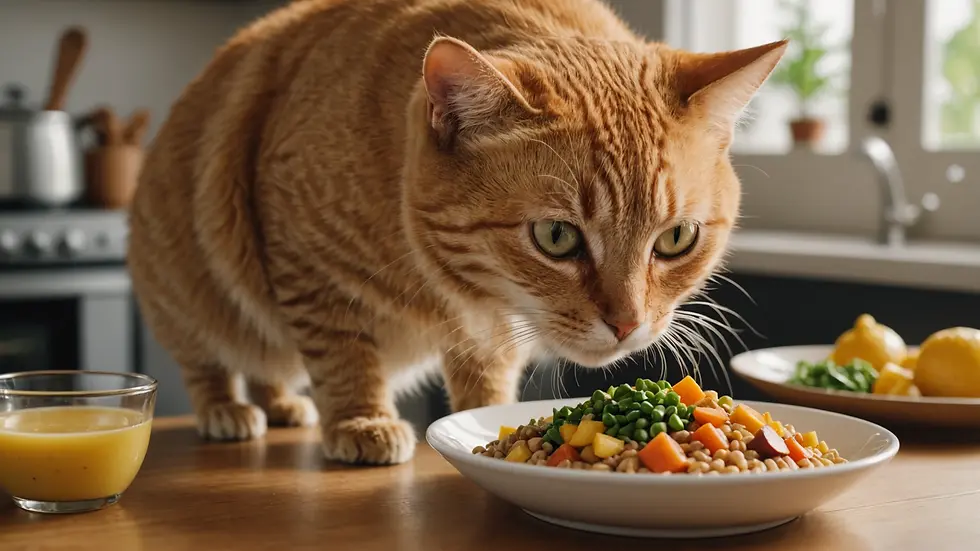What Are the Benefits of Cat Dietary Supplements?
- Jyotiraj Borah
- Feb 7
- 4 min read
Cats have distinct personalities and quirks, but every cat owner shares a common goal: keeping their feline companions healthy and happy. While a well-balanced diet through quality cat food is fundamental, dietary supplements can significantly enhance your cat’s nutrition and overall well-being. In this blog post, we will explore the many benefits of cat dietary supplements and help you understand if they are the right choice for your furry friend.
Understanding Dietary Supplements for Cats
Dietary supplements are formulated to add nutrients to a cat's diet that may be lacking in their regular food. These can include vitamins, minerals, amino acids, fatty acids, and other beneficial compounds.
Not all cats require the same nutrients. Factors such as age, breed, weight, and existing health issues influence what types of supplements may be necessary. For instance, an active young cat may have different needs than a senior cat with arthritis.
As more pet owners become savvy about feline nutrition, the market for dietary supplements has exploded, with products targeting specific health concerns, such as joint health, skin conditions, and digestion.
The Benefits of Cat Dietary Supplements
Enhanced Nutritional Support
Just like us, cats sometimes need additional nutrients to fill dietary gaps. While high-quality cat foods offer a good mix of proteins, fats, and essential vitamins, some cats may miss out due to food intolerances or picky eating.
Dietary supplements can bridge those gaps. For example, omega-3 fatty acids, often derived from fish oil, can reduce inflammation and boost skin and coat health. According to a study, 72% of cat owners reported improved coat condition in their pets after three months of omega-3 supplementation.
Improved Joint Health
As cats age, joint stiffness or arthritis can inhibit mobility. Joint health supplements containing glucosamine and chondroitin often support cartilage and reduce inflammation.
Many cat owners report remarkable improvements in their pets after introducing these supplements. For instance, a case study noted that 85% of cats showed increased activity levels and improved playfulness within four weeks of starting glucosamine supplements.

Support for Digestive Health
Digestive health is critical for every cat. Some may face challenges hailing from dietary changes or stress.
Probiotics and prebiotics are effective supplements for improving gut health by introducing beneficial bacteria. By promoting better digestion, they can enhance nutrient absorption and improve stool quality. Evidence indicates that 65% of cat owners observed firmer stools in their pets after incorporating probiotics.
Immune System Boost
Cats, like humans, can benefit from immune-boosting supplements. Antioxidants such as vitamins C and E can enhance overall immune function.
Research shows that senior cats have weaker immune systems. Regular supplementation can play a crucial role in keeping their defenses up against disease. For example, a study found that cats receiving extra vitamins had a 30% lower risk of respiratory infections compared to those that did not.
Skin and Coat Health
A cat's coat can reveal much about its health. Cats with dull or flaky coats may require extra support. Essential fatty acids, along with certain vitamins, can enhance skin hydration and coat shine.
Owners often see decreased scratching and shedding after using skin health supplements. Over time, this not only benefits the cat but also creates a more comfortable living environment.
Weight Management
Obesity is becoming increasingly common in cats, leading to health complications. Various dietary supplements can assist with weight management by enhancing metabolism and supporting healthy weight loss.
For instance, fiber supplements can help cats feel fuller longer, making it easier to control their appetite. Statistics show that 25% of overweight cats managed to reach a healthy weight with an appropriate diet plan that included fiber supplementation.
Specific Health Concerns
Certain health conditions, like kidney disease and diabetes, may require specific dietary adjustments. Supplements designed to address these concerns can be vital.
For instance, cats with kidney issues may benefit from phosphorus binders or omega-3 fatty acids for better kidney function. A veterinarian's advice is essential in determining which supplements best suit your cat's health status.

Choosing the Right Supplements
Now that you understand the potential benefits, consider these tips for choosing the right dietary supplements for your cat:
Consult Your Veterinarian
Always consult your veterinarian before adding new supplements to your cat's diet. They can assess your cat’s health needs and recommend safe, effective products tailored to those needs.
Look for Quality Products
Not all supplements are equal. Choose reputable brands known for their quality ingredients and safety testing. Research and read reviews to ensure you’re selecting the best options.
Consider Your Cat's Preferences
Cats can be finicky when it comes to food. Supplements come in various forms—chews, powders, and liquids. Experiment with different formats to see what your cat prefers, increasing the likelihood they will consume them.
Monitor Your Cat's Response
After introducing a new supplement, watch for changes in your cat’s behavior, energy levels, or overall health. Some may notice improvements quickly, while others might take time. Keep track of any changes to inform your vet during follow-up visits.
Addressing Common Concerns
Are Supplements Safe for Cats?
The safety of dietary supplements largely depends on their quality and dosage. Follow recommended guidelines from manufacturers or your veterinarian to avoid side effects.
Over-supplementation can lead to adverse effects, so always aim for a balanced approach.
Can Cats Get Too Much of a Good Thing?
Yes, excessive supplementation can lead to health problems. Overdosing on certain vitamins or minerals can result in toxicity and nutritional imbalances.
Vet guidance is crucial to ensure you offer the right supplements in suitable amounts.
Are Dietary Supplements a Substitute for Balanced Nutrition?
Dietary supplements are meant to enhance, not replace, a balanced diet. Quality cat food should meet the majority of your cat's nutritional needs. Use supplements to fill specific gaps or address health issues.

Wrapping Up the Benefits
Cat dietary supplements can make a significant difference in your pet's health and quality of life. From enhancing nutrition to supporting joint and digestive health, they provide targeted benefits that can lead to improved overall well-being. It is essential to approach supplementation thoughtfully, always guided by your veterinarian’s expertise and selecting high-quality products.
Understanding your cat's individual needs and integrating appropriate supplements into their diet can pave the way for a long, healthy, and joyful life. Whether your cat is an energetic kitten or a wise senior, the right supplementation may be just as vital as the love and care you provide daily.




Comments